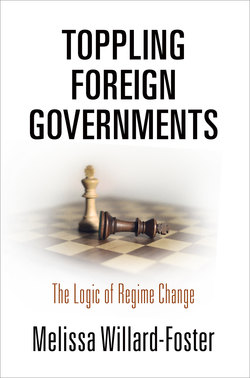Toppling Foreign Governments

Реклама. ООО «ЛитРес», ИНН: 7719571260.
Оглавление
Melissa Willard-Foster. Toppling Foreign Governments
Отрывок из книги
Toppling Foreign Governments
The Logic of Regime Change
.....
States may also demand regime change as part of a negotiated settlement, as the Clinton administration did in Haiti. Although states employ coercive bargaining tactics to attain these settlements, these cases qualify as FIRC. The foreign power is determined to oust the leader rather than accept an agreement that would let the leader remain in power. To exclude these cases would be to eliminate from the data instances in which the foreign power shares the same goal as other states seeking regime change but adopts different methods. I distinguish instances of coerced regime change by looking for evidence that the imposing state explicitly demanded that the targeted leader step down. The settlement ending the Franco-Prussian War, for example, obligated France to hold new elections. In contrast, Germany’s 1940 invasion of France, which coincided with a change in French leadership, is not included because France’s Vichy regime assumed power before seeking an armistice.34
In addition to the methods used to impose regime change, the extent of political change can vary as well. States may either remove the target state’s top leaders, or they may transform its political institutions. Some studies exclude leadership change from the definition of regime change because the target state’s institutions are left intact and, therefore, its regime, traditionally defined as a set of political institutions, does not change. However, this distinction conflates how regime change ends with how it is pursued. Foreign powers sometimes depose leaders to produce institutional change. The United States, for example, helped facilitate Iran’s transition from a constitutional monarchy to an authoritarian state through leadership change in 1953. By removing that country’s popular prime minister, Mohammad Mosaddeq, and supporting the Shah, the United States obtained institutional change, but it did not impose institutions. In Chapter 2, I discuss the various ways in which states effect regime change, including what level of force they use and whether they transform the target state’s institutions or simply depose its leaders. The data used in Chapter 3 include both types of FIRC.
.....